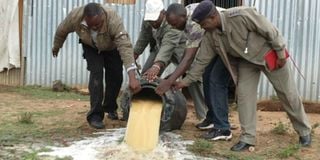Why no politician in Ugenya can dare criticise the chang’aa business

Police pour illicit brew nabbed from a chang'aa den.
Ending chang'aa brewing in Ugenya sub-county, Siaya County, is comparable to trying to cut a mogumo tree with a razor blade.
The art of brewing is passed from one generation to another and it is part of life in that region, explaining why the government has been unable to stop it.
The local brew, said to be triple-distilled traditionally and the purest and the most authentic, occasionally finds its way to other areas, including Nairobi.
Though the brew is illegal, many politicians from Siaya who seek support from voters in Ugenya often shy away from the subject of eradicating chang'aa.
"Chang'aa is for the down-trodden. The people who make chang'aa are the common locals who live in poverty and by telling them to stop brewing, you will be interfering with their livelihood," says Philip Ochieng, who hails from western Ugenya.
He adds that any leader who campaigns against chang'aa in Ugenya is committing political suicide.
"Anybody aspiring for a political seat in Ugenya will never touch the chang'aa subject, because it affects a majority of voters. Some politicians tried fighting chang'aa and failed terribly," he notes.
Illegal

38 year old Samwel Khamati narrates how he cheated death after taking illicit brew at Nairobi's kibera slums on 25 July 2010. Almost 10 people died after taking the brew while scores of others lost their sight on 25 July 2010 . .PETERSON GITHAIGA (NAIROBI)
Ugenya Deputy County Commissioner Mohammed Maow recently called on the people to stop making chang’aa but the public reacted by shouting him down.
"You must stop chang'aa brewing in this region because it is against the law. We must understand that chang'aa affects security in Ugenya and forthwith must be stopped,” he said.
The court in Ukwala, Ugenya, has many cases of people arrested for selling or brewing chang’aa or causing a disturbance while intoxicated.
“I have lost count of the number of times I have been to the police station on chang’aa-related charges. Even last week, I was arraigned and pleaded guilty to brewing chang’aa,” says 67-year-old grandmother Salome Omondi.
She adds: “I was widowed at the age of 40. At that time, my children were still in school and I had no source of income, so I had to start brewing chang’aa to educate them.”
Samuel Onjiri, a young man from Ugenya, says many leaders and prominent people from Ugenya went to school with money earned from chang'aa.
"Senator James Orengo is on record saying that he was educated by proceeds from chang'aa. That means the local drink is very important to the population. Attempting to end chang'aa in Ugenya is like trying to drain Lake Victoria," Mr Onjiri says.
He adds that the best way to help the community is by establishing a factory that would produce the drink on a large scale.
"The community has all that it takes to produce the drink in large quantities. The factory would add value to the drink and empower the community."
Chang'a is brewed from locally available materials: water, millet, and jaggery.





